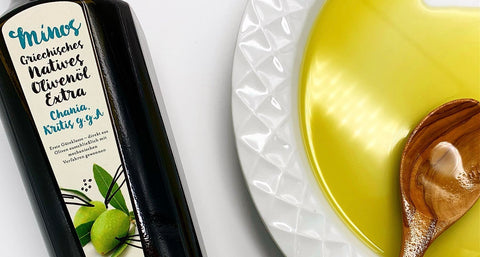Olive oil can do a lot of good for you. But there are also a lot of misconceptions. It's time to shed some light on the matter and answer your burning questions. Is olive oil really that healthy? Yes, it is. And here's why...
Olive oil is almost 100 percent liquid fat. In a world where the word "fat" makes many people uncomfortable, it is often unfairly feared. But in the great parade of fats, there are unsung heroes, and yes, extra virgin olive oil proudly leads that parade.
We've all heard the conflicting advice, from diet fads to internet-fueled fearmongering. But don't worry. We just did it.
Here are the five most pressing questions about olive oil, answered.
By the way, the golden rule is: It has to be extra virgin olive oil .
1) Is olive oil really that healthy?
Oh yes.
First, it is the natural alternative to ibuprofen. An anti-inflammatory, chock-full of antioxidants. One tablespoon is 10% of the adult dose of ibuprofen. It fights inflammation, a common denominator in many diseases, and offers a chemical-free, herbal remedy.
Second: intestinal health. The polyphenols in extra virgin olive oil promote intestinal microbes, ensure a happy stomach and first-class digestion, says Dr. Anne Fleck, internist and nutritional doctor.
It also helps promote a healthy heart. Numerous studies, including one by the German Heart Foundation , praise olive oil for its anti-inflammatory, cholesterol-lowering and blood vessel-protecting properties.
The fourth reason? Regulating blood sugar levels. This means reducing energy crashes, sugar cravings and the risk of diabetes.
The fifth benefit, often exaggerated online, links extra virgin olive oil to a "reduced risk of cancer, Alzheimer's and other neurodegenerative diseases and additional protection against viruses," according to the Charité - Universitätsmedizin Berlin . While it is not a cure-all, it has been proven to be helpful in prevention and risk minimization.
2) Why is it so healthy?
Yes, extra virgin olive oil is mostly made up of cholesterol-friendly monounsaturated fats and is a great source of vitamin E, but there's something more...
It's because of this dynamic duo: antioxidants (especially polyphenols) and oleic acid.
Antioxidants are, well, anti-oxidation. They neutralize harmful free radicals, which are unstable molecules with unpaired electrons that can damage cells and contribute to disease, illness and aging.
The antioxidants in extra virgin olive oil lend some electrons to stabilize these free radicals and reduce the risk of chronic diseases.
Polyphenols are one of the main antioxidants in olive oil and are responsible for some of the organoleptic properties you may have noticed, such as the bitterness on the palate, the spiciness in the throat and even the persistent "fresh" fruity or grassy notes over time. They are most commonly found in virgin oils. The more processed the olive oil is, the less polyphenols it contains.
Some research shows that polyphenols may also slow the absorption of carbohydrates. This means less glucose from the liver into the bloodstream, more control over blood sugar, and possibly a lower risk of type 2 diabetes.
It would be rude not to mention oleic acid here - the main fatty acid in olive oil. It is the secret that makes olive oil an excellent choice for cooking.
Oleic acid is more stable than polyunsaturated fats, especially at high temperatures. This stability makes extra virgin olive oil less susceptible to oxidation damage during cooking. Put more simply, it holds up well when things get hot, but not too hot.
3) How much should you have?
Medium amounts are ideal, but you can get by with four or five tablespoons a day.
A spoonful a day is a big trend in this area. Support from Pamela Reif , Barbara Schöneberger and Tim Mälzer might have something to do with it.
Celebrity endorsements aside, the real importance lies in following PREDIMED recommendations . Pour it liberally over cold salads, braised legumes, roasted vegetables and stir-fries to reap real benefits.
While research is inconsistent, some studies suggest that as little as half a tablespoon a day can reduce the risk of heart disease by 14%. For tangible benefits in your daily life, do more than just a dribble -- POUR.
4) But isn't olive oil bad for you?
Let's put it this way: 'FAT IS GOOD'.
Especially if it is unrefined, like extra virgin olive oil .
There was a time when it was said that heating extra virgin olive oil could make it carcinogenic. But that's simply not the case. The idea stems from misconceptions about smoke points, confusion with lower-quality oils, and outdated information.
We wrote an entire blog post about cooking with olive oil to explain temperatures and uses in the kitchen.
Furthermore, we don't need to remind you that the Mediterranean diet continues to be recognized as the healthiest diet in the world, with its traditional populations called "Blue Zones" for their longevity.
And these people with this diet have been consuming extra virgin olive oil as the primary fat at every meal since ancient times.
As Dr. Nicolai Worm, nutritionist, explains: "It is impossible to remove olive oil from the science of the Mediterranean diet. There is certainly no justification for suggesting that an alternative cooking fat could be used to achieve the effects of the Mediterranean diet."
5) Isn't olive oil like any other vegetable oil?
Absolutely not.
Extra virgin olive oil alive, full of antioxidants and with a shelf life of 18-24 months if unopened.
Outside of the virgin olive oil category, most olive oils are refined, highly processed, bleached and deodorized - all with the goal of creating a shelf-stable, lifeless oil at a lower price. Comparing extra virgin olive oil to regular olive oil is like comparing freshly squeezed orange juice to Fanta.




Comments (0)
There are no comments for this article. Be the first one to leave a message!